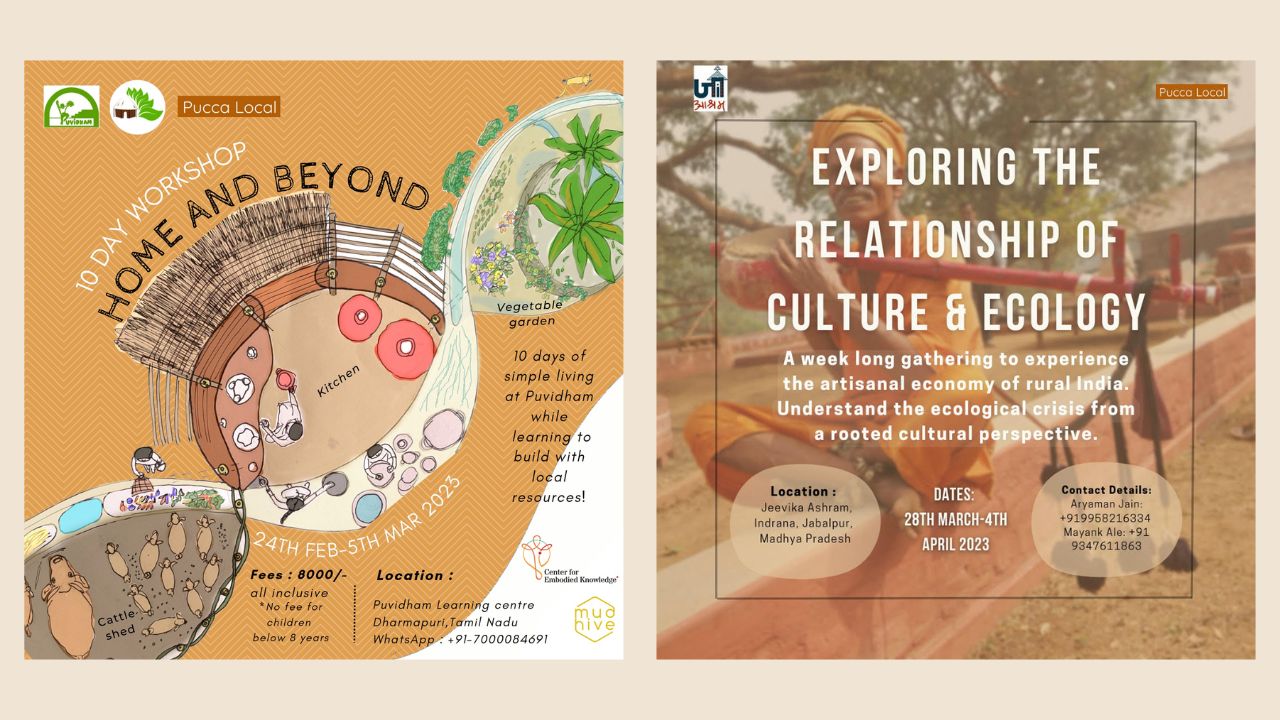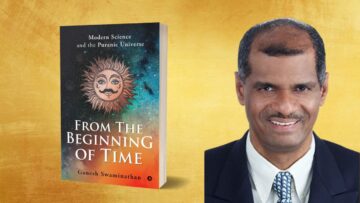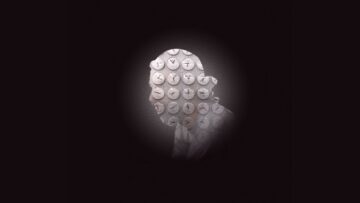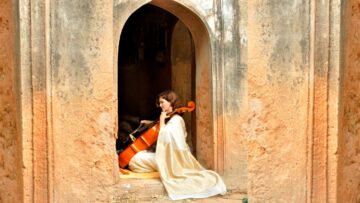Center for Embodied Knowledge in its continuous engagement with Indian Knowledge Systems , after supporting three teams and coalitions with crafts and Kalamakari is now supporting two young individuals, who we will call The CEK Co-Travelers, Dheeraj Annappureddy and Mayank Ale.
CEK is supporting Dheeraj and Mayank for 3 months, with a CEK fellowship and covering costs of holding the two workshops outlined below.
CEK believes this probably is one way forward, to document, work along with artisans in ecological and culturally appropriate habitat and architecture, educate and sustain our indigenous knowledge.
Workshop on Holistic Living
This is a ten day workshop at Puvidham in Dharmapuri, Tamilnadu, on living healthy and sustainably. Participants will learn to build with natural materials by helping build a kitchen and a toilet at the campus. They will also learn to live a nature based lifestyle with a daily routine that will involve natural farming, spinning, community cooking and animal care. Other than learning to build their own home, participants will learn to start becoming self-sufficient in clothing, food, education and healthcare.
Workshop on Ecology and Culture
This is a week-long workshop at Jeevika Ashram in Jabalpur, Madhya Pradesh, on the ecological harmony and aesthetics of the traditional artisanal economy. Participants will engage with local artisans in the villages around the Ashram and learn about the economic and social relations in which the artisans are embedded, along with the customs and practices of the communities that are carrying the knowledge.
About Dheeraj
Dheeraj did his schooling in Miryalguda, Nalgonda District, Telangana and studied at the School of Planning and Architecture in Bhopal. After graduating in 2014 he apprenticed with the vernacular architects Biju and Sindhu Bhaskar at Thannal Natural Homes in Thiruvannamalai , Tamil Nadu. In his exploration of traditional methods of building, Dheeraj has found an architectural style that aligns with his belief in ecological and social harmony. His teachers are the artisans who work with grasses, woods, stone, bamboo and mud in the villages of India. His continuing work is with local artisans and materials for clients and communities who are committed to building spaces using local available materials and skills.
Dheeraj’s work on Pati’s Kitchen was in collaboration with Thannal

About Mayank Ale
Mayank Ale is from the old city of Hyderabad and he studied fine arts at the Jawaharlal Nehru Architecture and Fine Arts University. During college Mayank got involved in ecology related issues . He was involved in many environmental campaigns and is a cycling activist. Mayank’s formative time was spent in and around Late Ravindra Sharma’s Kala Ashram in Adilabad. The ashram was a refuge for many artisans, most being the last practitioners of their embodied knowledge and skills. Mayank is focussed on agro-ecology and practicing farming around Hyderabad and advises others who want to do farming. His desire is to build an educational space for children and young adults in a rural setting which puts agriculture and crafts at the centre of its pedagogy, drawing on the rich Indian Knowledge System traditions.
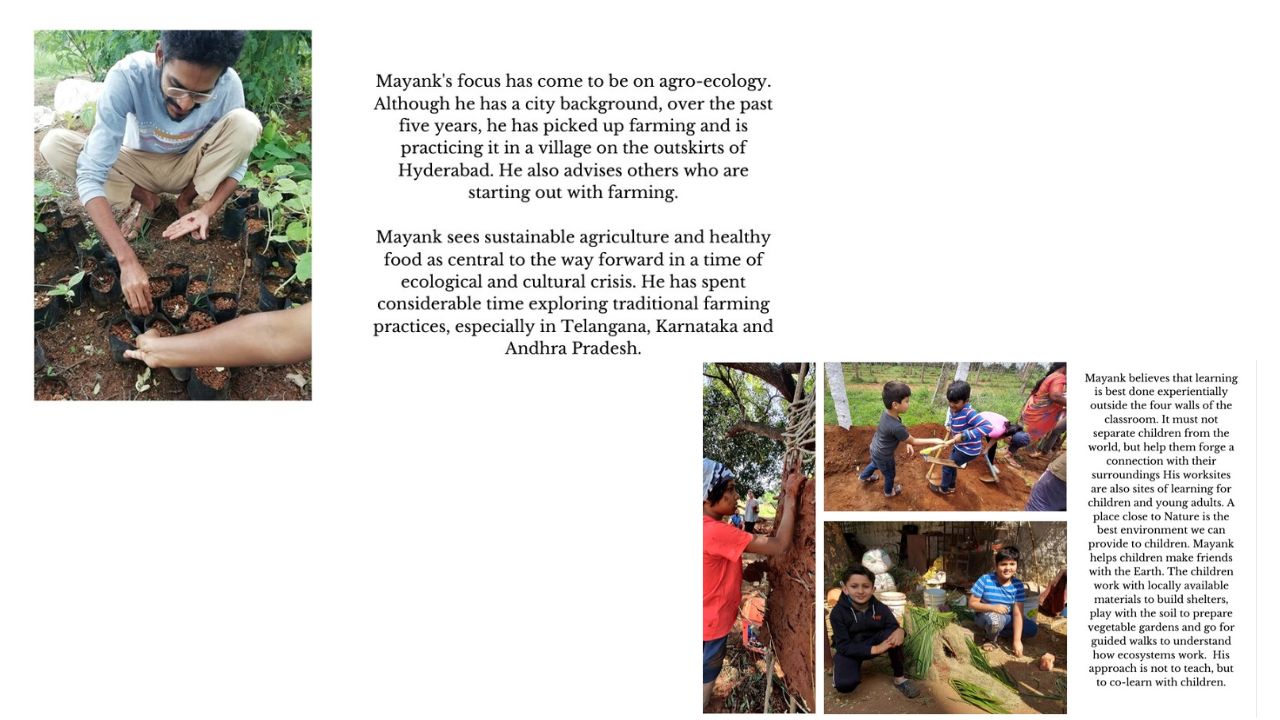
A long essay in December, 2022 in the Noema Magazine wrote on the crisis of modern construction , the Concrete Colonialism.
Concrete Built The Modern World. Now It’s Destroying It.
“Concrete is now the second-most consumed substance on Earth behind only water. Thirty-three billion tons of it are used each year, making it by far the most abundant human-made material in history. To make all that, we now devour around 4 billion tons of cement each year — more than in the entire first half of the 20th century, and over a billion tons more than the food we eat annually.
There is carbon dioxide everywhere in the atmosphere, and any time concrete is exposed to carbon dioxide, it permeates its pores.When the CO2 permeates it triggers a chemical reaction in the concrete that causes the rebar to rust. The steel expands because it’s rusting. And the concrete cracks and fails. And what’s especially interesting is that the amount of CO2 in the atmosphere in the last 100 years has greatly expanded, due in no small part to the fact the concrete industry is emitting massive amounts of it into the atmosphere.
Scientists are trying to figure out how long it takes reinforced concrete to degrade because of carbonation. The average result for a standard structure is 100 years, when you consider that reinforced concrete was invented around 100 years ago, you get this amazing image that the concrete all around the world is beginning to fail.
There won’t be a single perfect solution to the problem of concrete. One potential advancement is green concrete, which is decarbonized by changing the recipe, production process or longevity. Another is to capture emitted carbon at cement plants and store or reuse it.
Concrete’s spread across the African continent has eroded age-old artisanal craftsmanship and the use of local and more sustainable materials like mud, clay and wood. Skilled artisans are becoming harder and harder to find.
There are some things that will always need concrete. But for the poorest parts of Africa, we need to be looking at local materials. We’re still locked into a system that may have been fantastic in the 50s and 60s, but now we know about the maintenance concrete needs over time — and its role in the climate crisis. It just can’t be everyday material anymore.”
Looking at the huge crises in construction and the need to look at local building traditions CEK decided to support the two young men in Telangana with vernacular architecture, who are already doing the work of documenting and using traditional architectural materials of local woods, grasses and masonry in Telangana and South India along with agro forestry and raising awareness through education of traditional craft skills and a deep ecological sustainable life.
About Pucca Local
Pucca Local is a platform for young people working with indigenous knowledge in its culturally embedded form.
Pucca Local takes an interest in the traditional craft economy of India that it sees as an ecological and social alternative to the modern industrial paradigm.
We participate in the traditional economy by ourselves practicing traditional crafts. In addition, we facilitate a space for young people to take up traditional crafts in the process of our work, with master artisans as our teachers.
About Puvidham
Puvidham Rural Development Trust is an organisation focused on “Education for Sustainable Living” in Dharmapuri, Tamilnadu. It runs an alternative education centre, a social enterprise and a farm which are dedicated to ecological sustainability and social harmony. It is run by Meenakshi Amma who has 30 years of experience in sustainable architecture, healthy living and alternate education.
About Urvee
Urvee Trust is an organisation based in Pune and run by our friend, Amruta Naidu, dedicated to safe, eco-friendly and sustainable housing.
About Mud Hive
Mud Hive is a sustainable living collective based at Puvidham.
About Jeevika Ashram
Jeevika Ashram is a centre for research and education in Indian traditional knowledge. It aims to be a living museum of Indian civilization. It works through relationships with artisans of various crafts which are slowly fading away.



